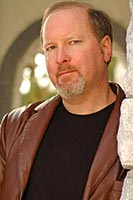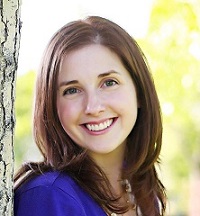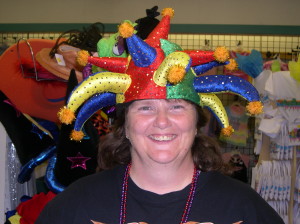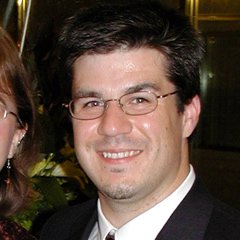As we close out the year, we thought it would be a good time to revisit this guest post from Kevin J. Anderson, a reminder that while you should be writing, this doesn’t necessarily mean your butt has to be planted in a chair to do so. This post originally ran on April 9th, 2012, but the advice it offers is timeless. We hope you enjoy, and please check in again tomorrow as we look back on The Greatest Gift I’ve Received as a Writer Month here at Fictorians.
A guest post by Kevin J. Anderson
 Everybody knows the best way to get writing done: put your butt in the chair, fingers on the keyboard, eyeballs on the screen…and type.
Everybody knows the best way to get writing done: put your butt in the chair, fingers on the keyboard, eyeballs on the screen…and type.
Unfortunately, with distractions everywhere (kids or pets demanding attention, phone ringing, email popping up, toilets that need cleaning…), the butt/chair/keyboard/monitor setup isn’t always the best way to be productive.
Maybe you need to think outside the keyboard.
I regularly write, and publish, an average of 300,000-500,000 words each year. To me the word “office” is only a loose term for the place where I get my writing done. I can sit in a bustling coffee shop with headphones on, and disappear into my story. I can take notes on the paper tablecloth in an Italian restaurant. I can write anywhere.
Most importantly, I have trained myself to write using a hand-held recorder while walking along beautiful trails, sinking into my imaginary worlds and characters. Yes, I talk to myself. It’s like telling stories around a campfire, engrossed in the plot, speaking aloud, letting the sentences roll off my tongue as my hiking boots roll off the miles. That way I can accomplish my exercise and sightseeing while being productive at the same time. A day in the mountains, forest, or desert is a day at work.
Sometimes other hikers I meet on the trail aren’t quite so accepting of my work methods. More than once I’ve been the recipient of angry glares. While climbing around the Flatirons near Boulder, a man snapped at me, “You shouldn’t be working out here. Just enjoy nature!”
(As if the two are mutually exclusive?)
At a campsite on the Grand Mesa, I was surrounded by tall trees whispering in the wind, near a rushing creek. I had my laptop out on the picnic table, reveling in the glorious surroundings as I edited chapters. Another camper felt compelled to march over to me. “Turn that thing off! You’re on vacation.”
Personally, I thought he should mind his own business, but more important he was making a completely unfounded assumption. The fact is, I wasn’t on vacation. That was my work day. While other people are doomed to go to the daily grind in a “dilbertville” office complex with fabric-walled cubicles, ringing phones, office gossip, and endless meetings, I get to do my work out in the Colorado mountains and canyons. There, I am inspired rather than distracted, all my senses filled with input (some of which is even relevant to the story I’m writing).
I have written a STAR WARS novel with Han Solo and Princess Leia at the polar cap of an ice planet while snowshoeing up Quandary Peak, a 14,265-ft mountain in central Colorado. I’ve written DUNE novels with Brian Herbert — all of them set on an arid desert planet — while trudging through the Great Sand Dunes National Park. I’ve written about ancient ruined alien cliff cities for my “Saga of Seven Suns” while exploring Anasazi ruins in Mesa Verde.
It’s the next best thing to being in the exotic locales of my imagination.
So don’t be fooled by the stereotypical picture of writer slaving over a computer at a desk. If you feel too self-conscious to talk to yourself and dictate finished prose, then just mull over ideas, characters, history and take notes. Or if that doesn’t work, just try a different place-take your laptop (or even a pen and paper notepad…they still function) and go to a coffeeshop where people don’t know you, or hide in a library carrel. My wife even sits in a car in a parking lot and dictates into her recorder when she really needs to get something done. Think about going into the “writer protection program” and disappear for a while.
For me, the way to do it is to get miles away from anybody looking for me.
So if you see me on the trail talking to myself, intent on something inside my head, remember — I’m not on vacation, I’m working. And I’d rather be working here outside on the trail than in any other office in the world.



 Dylan Blacquiere Bio:
Dylan Blacquiere Bio: